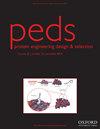Improving folding properties of computationally designed proteins.
IF 2.6
4区 生物学
Q3 BIOCHEMISTRY & MOLECULAR BIOLOGY
引用次数: 4
Abstract
While the field of computational protein design has witnessed amazing progression in recent years, folding properties still constitute a significant barrier towards designing new and larger proteins. In order to assess and improve folding properties of designed proteins, we have developed a genetics-based folding assay and selection system based on the essential enzyme, orotate phosphoribosyl transferase from Escherichia coli. This system allows for both screening of candidate designs with good folding properties and genetic selection of improved designs. Thus, we identified single amino acid substitutions in two failed designs that rescued poorly folding and unstable proteins. Furthermore, when these substitutions were transferred into a well-structured design featuring a complex folding profile, the resulting protein exhibited native-like cooperative folding with significantly improved stability. In protein design, a single amino acid can make the difference between folding and misfolding, and this approach provides a useful new platform to identify and improve candidate designs.提高计算设计蛋白质的折叠性能。
虽然近年来计算蛋白质设计领域取得了惊人的进展,但折叠特性仍然是设计新的更大的蛋白质的重要障碍。为了评估和改善所设计蛋白质的折叠特性,我们开发了一种基于遗传学的折叠检测和选择系统,该系统基于大肠杆菌的必需酶——羊角酸磷酸核糖转移酶。该系统允许筛选具有良好折叠特性的候选设计和改进设计的遗传选择。因此,我们在两个失败的设计中确定了单氨基酸取代,挽救了折叠不良和不稳定的蛋白质。此外,当这些取代被转移到具有复杂折叠轮廓的结构良好的设计中时,所得到的蛋白质表现出与天然蛋白相似的协同折叠,并显著提高了稳定性。在蛋白质设计中,单个氨基酸可以决定折叠和错误折叠的差异,该方法为识别和改进候选设计提供了一个有用的新平台。
本文章由计算机程序翻译,如有差异,请以英文原文为准。
求助全文
约1分钟内获得全文
求助全文
来源期刊

Protein Engineering Design & Selection
生物-生化与分子生物学
CiteScore
3.30
自引率
4.20%
发文量
14
审稿时长
6-12 weeks
期刊介绍:
Protein Engineering, Design and Selection (PEDS) publishes high-quality research papers and review articles relevant to the engineering, design and selection of proteins for use in biotechnology and therapy, and for understanding the fundamental link between protein sequence, structure, dynamics, function, and evolution.
 求助内容:
求助内容: 应助结果提醒方式:
应助结果提醒方式:


